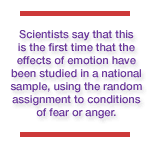The scientists, all experts in studying the way people think and behave, were able to quickly pull together an experiment that studied the emotions and perceptions of the risks of terrorism of nearly 1,000 American men, women and teens following the terrorist attacks on America.
The results have been presented to NATO officials assessing the carryover impact of terrorism and are in press with the journal Psychological Science. The experiment results may have implications for better understanding of consumer behavior, the role of the media and public support for
the war on terrorism.
Jennifer Lerner, an assistant professor of social and decision sciences and lead
author of the paper, said that the emotional responses of Americans "clearly influence everything from future support for military action to decisions to travel."
Media portrayals of the terrorist attacks strongly influence emotional responses, producing anger in some instances and fear in others.
The experiment involving nearly 1,000 American men and women ages 13 to 88, suggests that heightened emotions of fear and anger affect responses to the threat of terror facing the nation, with anger promoting greater optimism and more aggressive policies.
Feelings of fear likely fueled the sense of pessimism that contributed to the national economic downturn after September 11 and the call for tighter security; feelings of anger likely fed the sense of optimism, contributing to support for military action and the sense that threats could be controlled.
 Using Web TVs supplied by the research corporation Knowledge Networks, the project initially asked respondents about their reactions only nine days after the attacks. Eight weeks later, using TV imagery and newspaper reports from major media organizations broadcast on the Web TVs, the researchers surveyed the same people again. For this second survey, half of the sample was exposed to a fear-inducing media clip, while the other half was exposed to an anger-inducing clip.
Using Web TVs supplied by the research corporation Knowledge Networks, the project initially asked respondents about their reactions only nine days after the attacks. Eight weeks later, using TV imagery and newspaper reports from major media organizations broadcast on the Web TVs, the researchers surveyed the same people again. For this second survey, half of the sample was exposed to a fear-inducing media clip, while the other half was exposed to an anger-inducing clip.
Carnegie Mellon researchers found that Americans randomly assigned to the "fear condition" perceived greater risks from terrorism, while those in the "anger condition" perceived less risk.
"Brief reminders of media stories elicited emotions that shaped Americans' perceptions of their own level of risk," Lerner explained. " Stories that induced fear increased their perception that they would be hurt in a terrorist attack, while stories that induced anger reduced their perception of personal risk.
"Regardless of whether we randomly exposed people to emotion-inducing media stories or if we measured naturally-occurring emotions, greater anger led to greater optimism," Lerner said.
Scientifically, the experiment plows new ground. Scientists say that this is the first time that the effects of emotion have been studied in a national sample, using the random assignment to conditions of fear or anger.
The experiment also underscored the profound impact that media coverage has on the American public, Lerner said.
Because emotions often affect economic decisions and the formation of policies, team members stressed the importance of undertaking further studies like this one.
"Citizens need to understand these processes in order to apply their hearts and minds to what might be a protracted struggle with the risks of terror," said
University Professor of Social and Decision Sciences Baruch Fischhoff, a member of the scientific team.
In addition to Lerner and Fischhoff, the team included doctoral students Roxana Gonzalez and Deborah Small.
Grants from the National Science Foundation and the American Psychological
Association funded the study.
More details of the study are online at www.cmu.edu/PR/press_releases/020409_terror.html
Return to top
Teresa Sokol Thomas
(05/10/02)